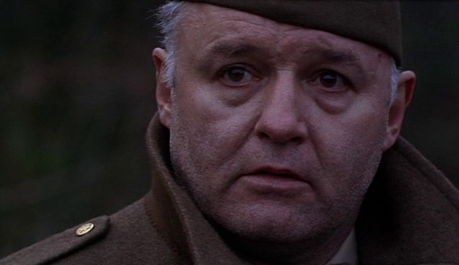 Rod Steiger is Classic Hollywood's most frustrating star. With the right role and capable direction, Steiger can be brilliant: On the Waterfront, Doctor Zhivago, The Pawnbroker, In the Heat of the Night. But too often he's a Method caricature, bugging out eyes, gnashing teeth, twisting his voice into a tortured hyena snarl. His bellowing, eyebrow-arching Napoleon in Waterloo might be cinema's worst performance by a great actor - and that wasn't a bad movie.
Rod Steiger is Classic Hollywood's most frustrating star. With the right role and capable direction, Steiger can be brilliant: On the Waterfront, Doctor Zhivago, The Pawnbroker, In the Heat of the Night. But too often he's a Method caricature, bugging out eyes, gnashing teeth, twisting his voice into a tortured hyena snarl. His bellowing, eyebrow-arching Napoleon in Waterloo might be cinema's worst performance by a great actor - and that wasn't a bad movie.The Sergeant (1968) is another dreary '60s psychodrama casting the military as repressed nutcases and homosexuals as tortured psychopaths. Who better to enliven such turgidity than that master of nuance, Rod Steiger?
Sergeant Callan (Rod Steiger) arrives at a remote Army base in postwar France. Discipline is slack and the Captain (Frank Latimore) is preoccupied by staff meetings and booze. Callan soon takes command, instilling harsh discipline upon the garrison. He takes a fancy towards Private Swanson (John Phillip Law), making him orderly and chaperoning him on dates. Swanson starts to suspect something uncouth about Callan's attentions - evidenced by the Sergeant's increasingly erratic behavior.
Adapted by Dennis Murphy from his own novel, The Sergeant shares Reflections in a Golden Eye's (1967) interplay of sexual frustration and military discipline. Without that movie's camp sensibility, it's a tedious exercise in unintentional homophobia. The Sergeant envisions Callan as a tragic figure, tormented and finally destroyed by his sexuality. Instead he's a predatory pervert, stalking his intended, doling out rewards and punishment and finally assaulting Swanson. Why should we sympathize with this creep?
Murphy and director John Flynn further hobble things with endless detours. The Sergeant opens with an exciting World War II battle completely detached from the plot. If anything it detracts, painting Callan as nuts (strangling an unarmed German) from the get-go. Swanson romances a pretty French girl (Ludmilla Mikael), to contrast his heterosexuality against Callan's "sickness." And a subplot where Callan punishes a hard-drinking Private (Elliott Sullivan) is so thinly sketched we don't care. These just delay the preordained conclusion, obvious to anyone who's seen The Children's Hour or any other gay-themed '60s drama.
Rod Steiger finds inventive new ways to chew scenery, even without speaking. Disappointed by Swanson's rejection, his smile slowly crinkles, muscle by muscle, into a disappointed smirk. During his final breakdown, his voice cracks into a ghastly howl, tears raining down his cheeks. In contrast, John Phillip Law never varies his line readings and mannerisms, occasionally crinkling his eyes into a startled scowl. Admittedly, pairing a rabid over-actor with a costar who can't act is a novel conceit. But it's not enough to carry a film.
Perhaps if The Sergeant had something meaningful to say about homosexuality or military life, we could overlook the shoddy plot and ludicrous acting. But that's all we get: a ream of cliches, earnestly enacted by a cipher and a ravenous ham.

